Academic Skills Portfolio: Skills Development and Time Management
VerifiedAdded on 2023/06/07
|16
|3539
|381
Project
AI Summary
This academic portfolio, developed by a student, provides a comprehensive overview of essential academic skills. It begins with a detailed time management plan, including weekly schedules and the application of the Pomodoro technique, alongside reflections structured using the Gibbs model. The portfolio then delves into resource utilization, highlighting key tools like time management techniques, active listening, and internet resources. It incorporates reflective analysis on skill development, including writing and research skills, and identifies areas for improvement such as summarization. Further, it explores literature searching, note-taking using Cornell and mind-mapping methods, and addresses referencing and plagiarism, including a guide to AU Harvard referencing. The portfolio concludes with an action plan for continued skill development, emphasizing the importance of these skills for future academic and professional success.
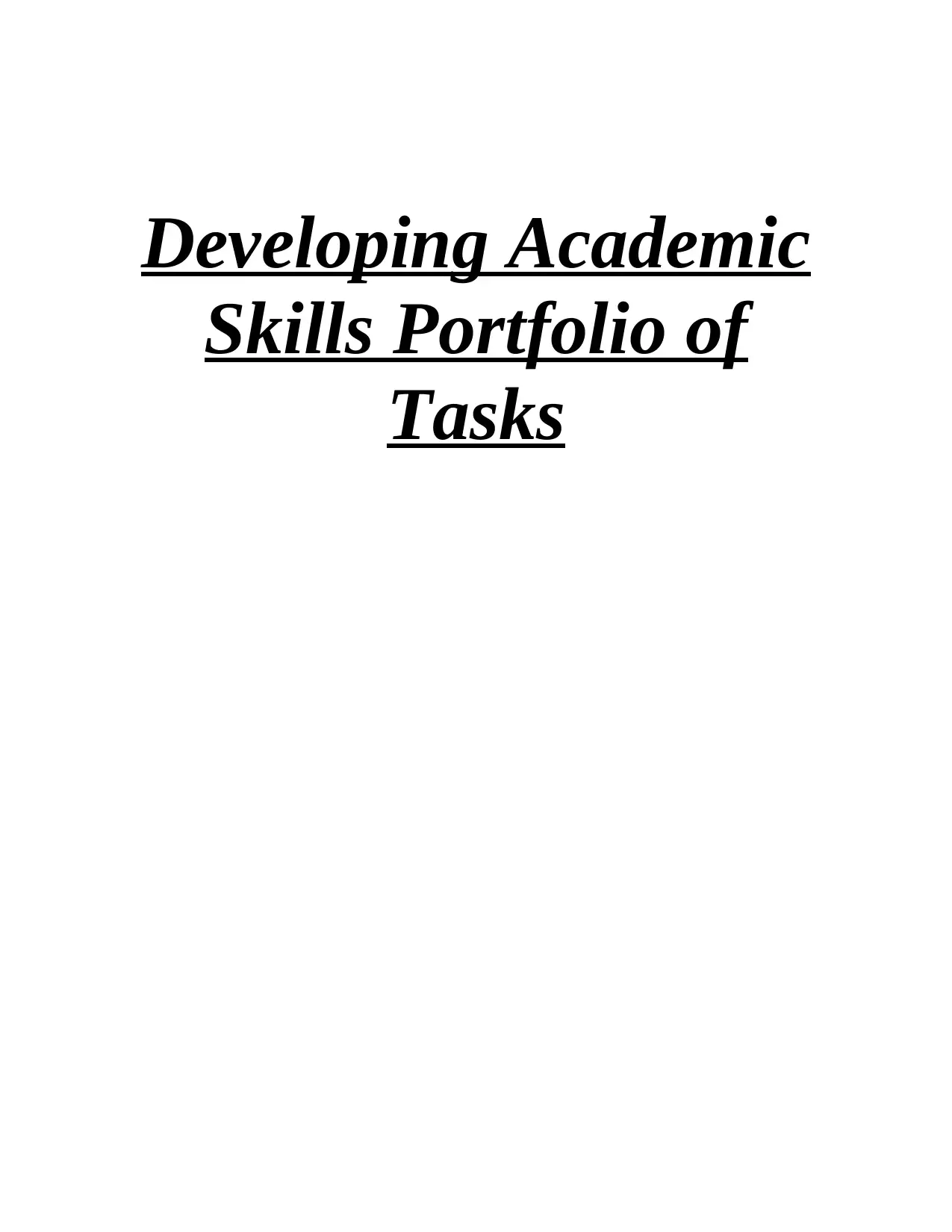
Developing Academic
Skills Portfolio of
Tasks
Skills Portfolio of
Tasks
Paraphrase This Document
Need a fresh take? Get an instant paraphrase of this document with our AI Paraphraser
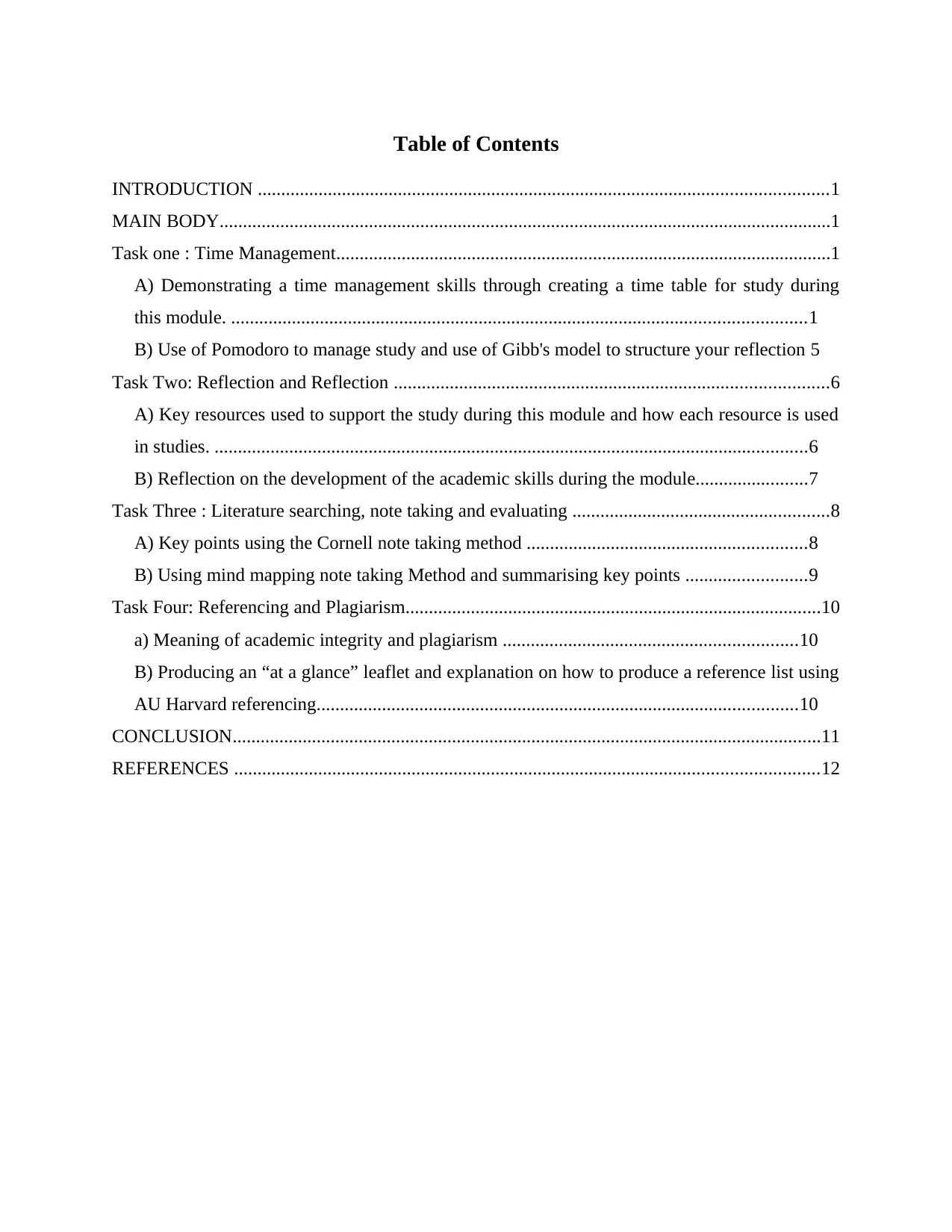
Table of Contents
INTRODUCTION ..........................................................................................................................1
MAIN BODY...................................................................................................................................1
Task one : Time Management..........................................................................................................1
A) Demonstrating a time management skills through creating a time table for study during
this module. ...........................................................................................................................1
B) Use of Pomodoro to manage study and use of Gibb's model to structure your reflection 5
Task Two: Reflection and Reflection .............................................................................................6
A) Key resources used to support the study during this module and how each resource is used
in studies. ...............................................................................................................................6
B) Reflection on the development of the academic skills during the module........................7
Task Three : Literature searching, note taking and evaluating .......................................................8
A) Key points using the Cornell note taking method ............................................................8
B) Using mind mapping note taking Method and summarising key points ..........................9
Task Four: Referencing and Plagiarism.........................................................................................10
a) Meaning of academic integrity and plagiarism ...............................................................10
B) Producing an “at a glance” leaflet and explanation on how to produce a reference list using
AU Harvard referencing.......................................................................................................10
CONCLUSION..............................................................................................................................11
REFERENCES .............................................................................................................................12
INTRODUCTION ..........................................................................................................................1
MAIN BODY...................................................................................................................................1
Task one : Time Management..........................................................................................................1
A) Demonstrating a time management skills through creating a time table for study during
this module. ...........................................................................................................................1
B) Use of Pomodoro to manage study and use of Gibb's model to structure your reflection 5
Task Two: Reflection and Reflection .............................................................................................6
A) Key resources used to support the study during this module and how each resource is used
in studies. ...............................................................................................................................6
B) Reflection on the development of the academic skills during the module........................7
Task Three : Literature searching, note taking and evaluating .......................................................8
A) Key points using the Cornell note taking method ............................................................8
B) Using mind mapping note taking Method and summarising key points ..........................9
Task Four: Referencing and Plagiarism.........................................................................................10
a) Meaning of academic integrity and plagiarism ...............................................................10
B) Producing an “at a glance” leaflet and explanation on how to produce a reference list using
AU Harvard referencing.......................................................................................................10
CONCLUSION..............................................................................................................................11
REFERENCES .............................................................................................................................12
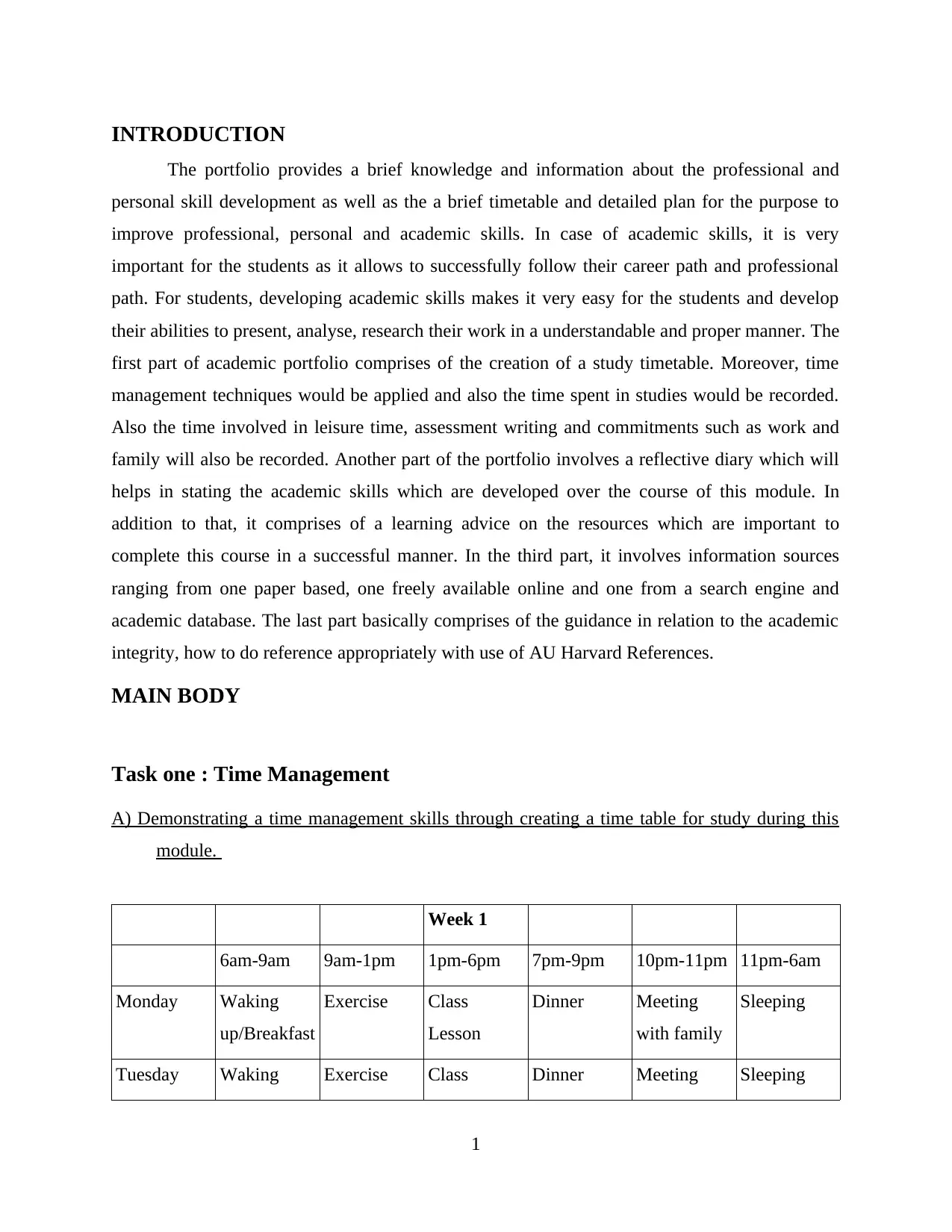
INTRODUCTION
The portfolio provides a brief knowledge and information about the professional and
personal skill development as well as the a brief timetable and detailed plan for the purpose to
improve professional, personal and academic skills. In case of academic skills, it is very
important for the students as it allows to successfully follow their career path and professional
path. For students, developing academic skills makes it very easy for the students and develop
their abilities to present, analyse, research their work in a understandable and proper manner. The
first part of academic portfolio comprises of the creation of a study timetable. Moreover, time
management techniques would be applied and also the time spent in studies would be recorded.
Also the time involved in leisure time, assessment writing and commitments such as work and
family will also be recorded. Another part of the portfolio involves a reflective diary which will
helps in stating the academic skills which are developed over the course of this module. In
addition to that, it comprises of a learning advice on the resources which are important to
complete this course in a successful manner. In the third part, it involves information sources
ranging from one paper based, one freely available online and one from a search engine and
academic database. The last part basically comprises of the guidance in relation to the academic
integrity, how to do reference appropriately with use of AU Harvard References.
MAIN BODY
Task one : Time Management
A) Demonstrating a time management skills through creating a time table for study during this
module.
Week 1
6am-9am 9am-1pm 1pm-6pm 7pm-9pm 10pm-11pm 11pm-6am
Monday Waking
up/Breakfast
Exercise Class
Lesson
Dinner Meeting
with family
Sleeping
Tuesday Waking Exercise Class Dinner Meeting Sleeping
1
The portfolio provides a brief knowledge and information about the professional and
personal skill development as well as the a brief timetable and detailed plan for the purpose to
improve professional, personal and academic skills. In case of academic skills, it is very
important for the students as it allows to successfully follow their career path and professional
path. For students, developing academic skills makes it very easy for the students and develop
their abilities to present, analyse, research their work in a understandable and proper manner. The
first part of academic portfolio comprises of the creation of a study timetable. Moreover, time
management techniques would be applied and also the time spent in studies would be recorded.
Also the time involved in leisure time, assessment writing and commitments such as work and
family will also be recorded. Another part of the portfolio involves a reflective diary which will
helps in stating the academic skills which are developed over the course of this module. In
addition to that, it comprises of a learning advice on the resources which are important to
complete this course in a successful manner. In the third part, it involves information sources
ranging from one paper based, one freely available online and one from a search engine and
academic database. The last part basically comprises of the guidance in relation to the academic
integrity, how to do reference appropriately with use of AU Harvard References.
MAIN BODY
Task one : Time Management
A) Demonstrating a time management skills through creating a time table for study during this
module.
Week 1
6am-9am 9am-1pm 1pm-6pm 7pm-9pm 10pm-11pm 11pm-6am
Monday Waking
up/Breakfast
Exercise Class
Lesson
Dinner Meeting
with family
Sleeping
Tuesday Waking Exercise Class Dinner Meeting Sleeping
1
⊘ This is a preview!⊘
Do you want full access?
Subscribe today to unlock all pages.

Trusted by 1+ million students worldwide
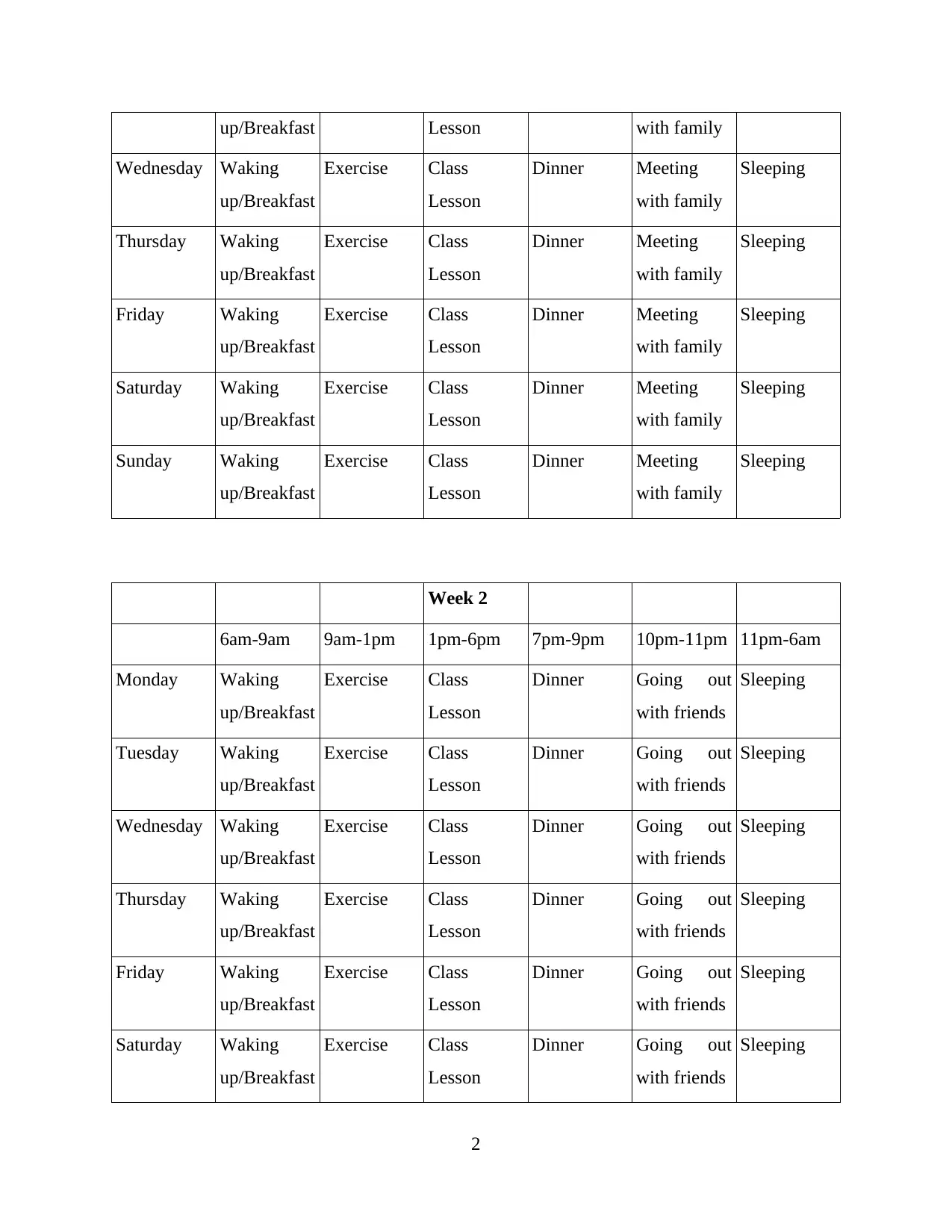
up/Breakfast Lesson with family
Wednesday Waking
up/Breakfast
Exercise Class
Lesson
Dinner Meeting
with family
Sleeping
Thursday Waking
up/Breakfast
Exercise Class
Lesson
Dinner Meeting
with family
Sleeping
Friday Waking
up/Breakfast
Exercise Class
Lesson
Dinner Meeting
with family
Sleeping
Saturday Waking
up/Breakfast
Exercise Class
Lesson
Dinner Meeting
with family
Sleeping
Sunday Waking
up/Breakfast
Exercise Class
Lesson
Dinner Meeting
with family
Sleeping
Week 2
6am-9am 9am-1pm 1pm-6pm 7pm-9pm 10pm-11pm 11pm-6am
Monday Waking
up/Breakfast
Exercise Class
Lesson
Dinner Going out
with friends
Sleeping
Tuesday Waking
up/Breakfast
Exercise Class
Lesson
Dinner Going out
with friends
Sleeping
Wednesday Waking
up/Breakfast
Exercise Class
Lesson
Dinner Going out
with friends
Sleeping
Thursday Waking
up/Breakfast
Exercise Class
Lesson
Dinner Going out
with friends
Sleeping
Friday Waking
up/Breakfast
Exercise Class
Lesson
Dinner Going out
with friends
Sleeping
Saturday Waking
up/Breakfast
Exercise Class
Lesson
Dinner Going out
with friends
Sleeping
2
Wednesday Waking
up/Breakfast
Exercise Class
Lesson
Dinner Meeting
with family
Sleeping
Thursday Waking
up/Breakfast
Exercise Class
Lesson
Dinner Meeting
with family
Sleeping
Friday Waking
up/Breakfast
Exercise Class
Lesson
Dinner Meeting
with family
Sleeping
Saturday Waking
up/Breakfast
Exercise Class
Lesson
Dinner Meeting
with family
Sleeping
Sunday Waking
up/Breakfast
Exercise Class
Lesson
Dinner Meeting
with family
Sleeping
Week 2
6am-9am 9am-1pm 1pm-6pm 7pm-9pm 10pm-11pm 11pm-6am
Monday Waking
up/Breakfast
Exercise Class
Lesson
Dinner Going out
with friends
Sleeping
Tuesday Waking
up/Breakfast
Exercise Class
Lesson
Dinner Going out
with friends
Sleeping
Wednesday Waking
up/Breakfast
Exercise Class
Lesson
Dinner Going out
with friends
Sleeping
Thursday Waking
up/Breakfast
Exercise Class
Lesson
Dinner Going out
with friends
Sleeping
Friday Waking
up/Breakfast
Exercise Class
Lesson
Dinner Going out
with friends
Sleeping
Saturday Waking
up/Breakfast
Exercise Class
Lesson
Dinner Going out
with friends
Sleeping
2
Paraphrase This Document
Need a fresh take? Get an instant paraphrase of this document with our AI Paraphraser
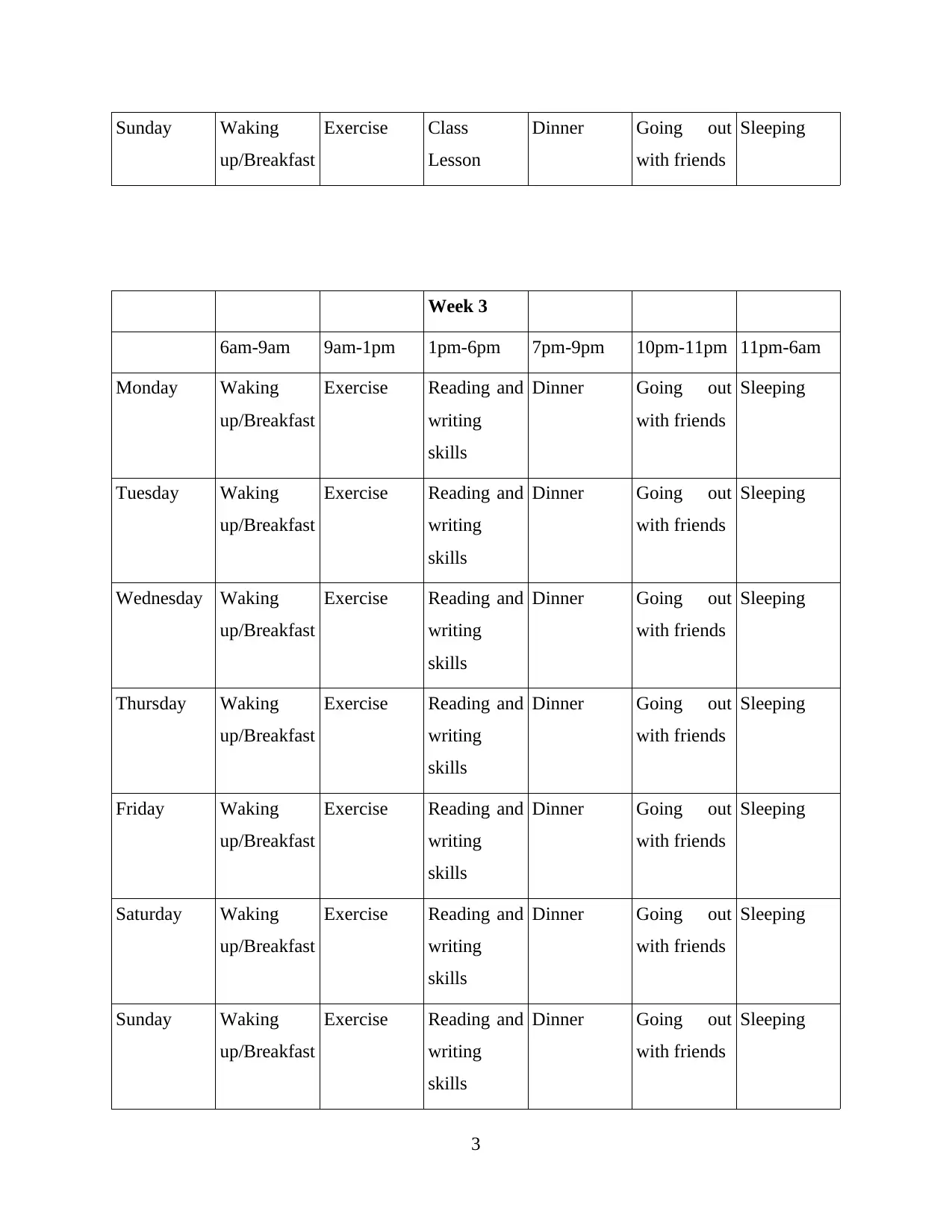
Sunday Waking
up/Breakfast
Exercise Class
Lesson
Dinner Going out
with friends
Sleeping
Week 3
6am-9am 9am-1pm 1pm-6pm 7pm-9pm 10pm-11pm 11pm-6am
Monday Waking
up/Breakfast
Exercise Reading and
writing
skills
Dinner Going out
with friends
Sleeping
Tuesday Waking
up/Breakfast
Exercise Reading and
writing
skills
Dinner Going out
with friends
Sleeping
Wednesday Waking
up/Breakfast
Exercise Reading and
writing
skills
Dinner Going out
with friends
Sleeping
Thursday Waking
up/Breakfast
Exercise Reading and
writing
skills
Dinner Going out
with friends
Sleeping
Friday Waking
up/Breakfast
Exercise Reading and
writing
skills
Dinner Going out
with friends
Sleeping
Saturday Waking
up/Breakfast
Exercise Reading and
writing
skills
Dinner Going out
with friends
Sleeping
Sunday Waking
up/Breakfast
Exercise Reading and
writing
skills
Dinner Going out
with friends
Sleeping
3
up/Breakfast
Exercise Class
Lesson
Dinner Going out
with friends
Sleeping
Week 3
6am-9am 9am-1pm 1pm-6pm 7pm-9pm 10pm-11pm 11pm-6am
Monday Waking
up/Breakfast
Exercise Reading and
writing
skills
Dinner Going out
with friends
Sleeping
Tuesday Waking
up/Breakfast
Exercise Reading and
writing
skills
Dinner Going out
with friends
Sleeping
Wednesday Waking
up/Breakfast
Exercise Reading and
writing
skills
Dinner Going out
with friends
Sleeping
Thursday Waking
up/Breakfast
Exercise Reading and
writing
skills
Dinner Going out
with friends
Sleeping
Friday Waking
up/Breakfast
Exercise Reading and
writing
skills
Dinner Going out
with friends
Sleeping
Saturday Waking
up/Breakfast
Exercise Reading and
writing
skills
Dinner Going out
with friends
Sleeping
Sunday Waking
up/Breakfast
Exercise Reading and
writing
skills
Dinner Going out
with friends
Sleeping
3
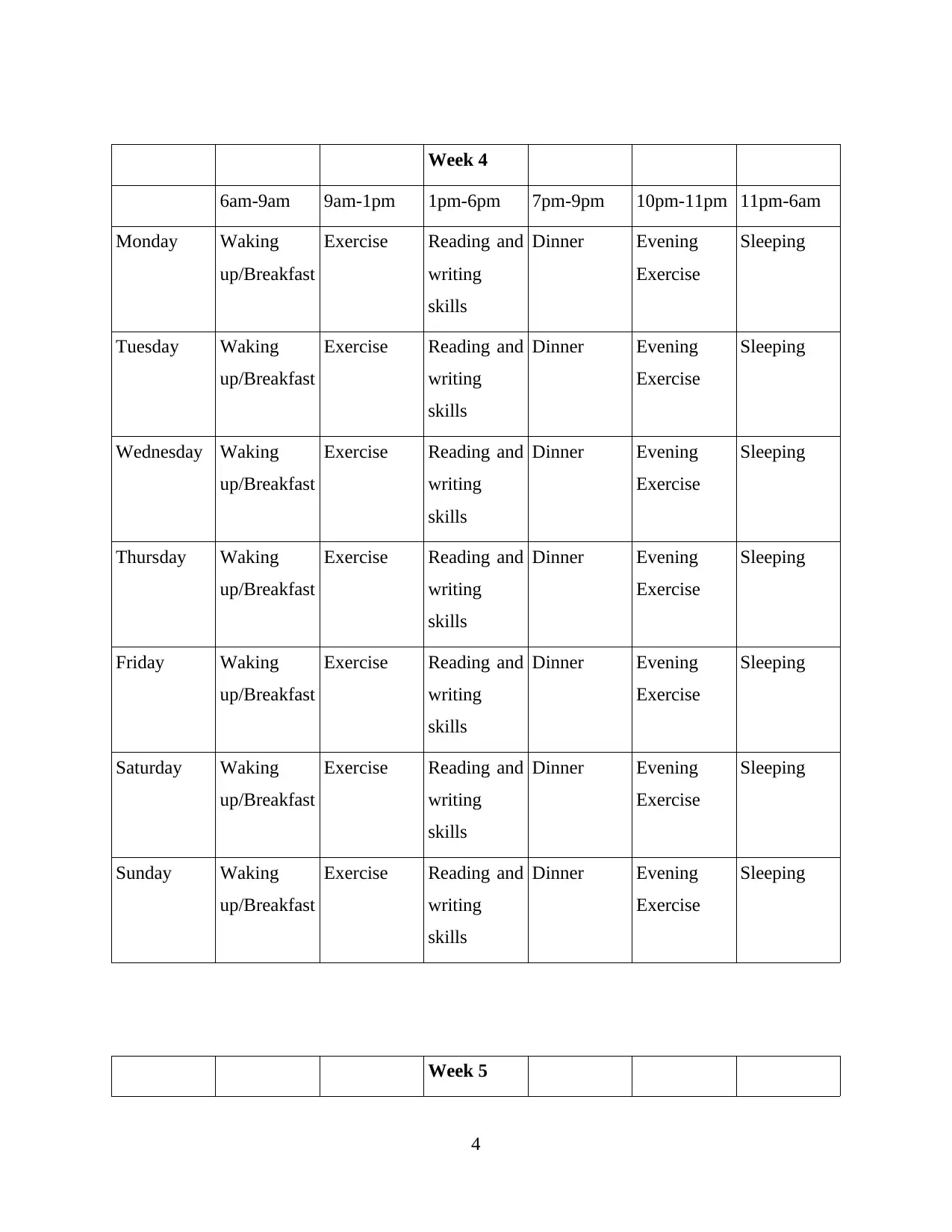
Week 4
6am-9am 9am-1pm 1pm-6pm 7pm-9pm 10pm-11pm 11pm-6am
Monday Waking
up/Breakfast
Exercise Reading and
writing
skills
Dinner Evening
Exercise
Sleeping
Tuesday Waking
up/Breakfast
Exercise Reading and
writing
skills
Dinner Evening
Exercise
Sleeping
Wednesday Waking
up/Breakfast
Exercise Reading and
writing
skills
Dinner Evening
Exercise
Sleeping
Thursday Waking
up/Breakfast
Exercise Reading and
writing
skills
Dinner Evening
Exercise
Sleeping
Friday Waking
up/Breakfast
Exercise Reading and
writing
skills
Dinner Evening
Exercise
Sleeping
Saturday Waking
up/Breakfast
Exercise Reading and
writing
skills
Dinner Evening
Exercise
Sleeping
Sunday Waking
up/Breakfast
Exercise Reading and
writing
skills
Dinner Evening
Exercise
Sleeping
Week 5
4
6am-9am 9am-1pm 1pm-6pm 7pm-9pm 10pm-11pm 11pm-6am
Monday Waking
up/Breakfast
Exercise Reading and
writing
skills
Dinner Evening
Exercise
Sleeping
Tuesday Waking
up/Breakfast
Exercise Reading and
writing
skills
Dinner Evening
Exercise
Sleeping
Wednesday Waking
up/Breakfast
Exercise Reading and
writing
skills
Dinner Evening
Exercise
Sleeping
Thursday Waking
up/Breakfast
Exercise Reading and
writing
skills
Dinner Evening
Exercise
Sleeping
Friday Waking
up/Breakfast
Exercise Reading and
writing
skills
Dinner Evening
Exercise
Sleeping
Saturday Waking
up/Breakfast
Exercise Reading and
writing
skills
Dinner Evening
Exercise
Sleeping
Sunday Waking
up/Breakfast
Exercise Reading and
writing
skills
Dinner Evening
Exercise
Sleeping
Week 5
4
⊘ This is a preview!⊘
Do you want full access?
Subscribe today to unlock all pages.

Trusted by 1+ million students worldwide
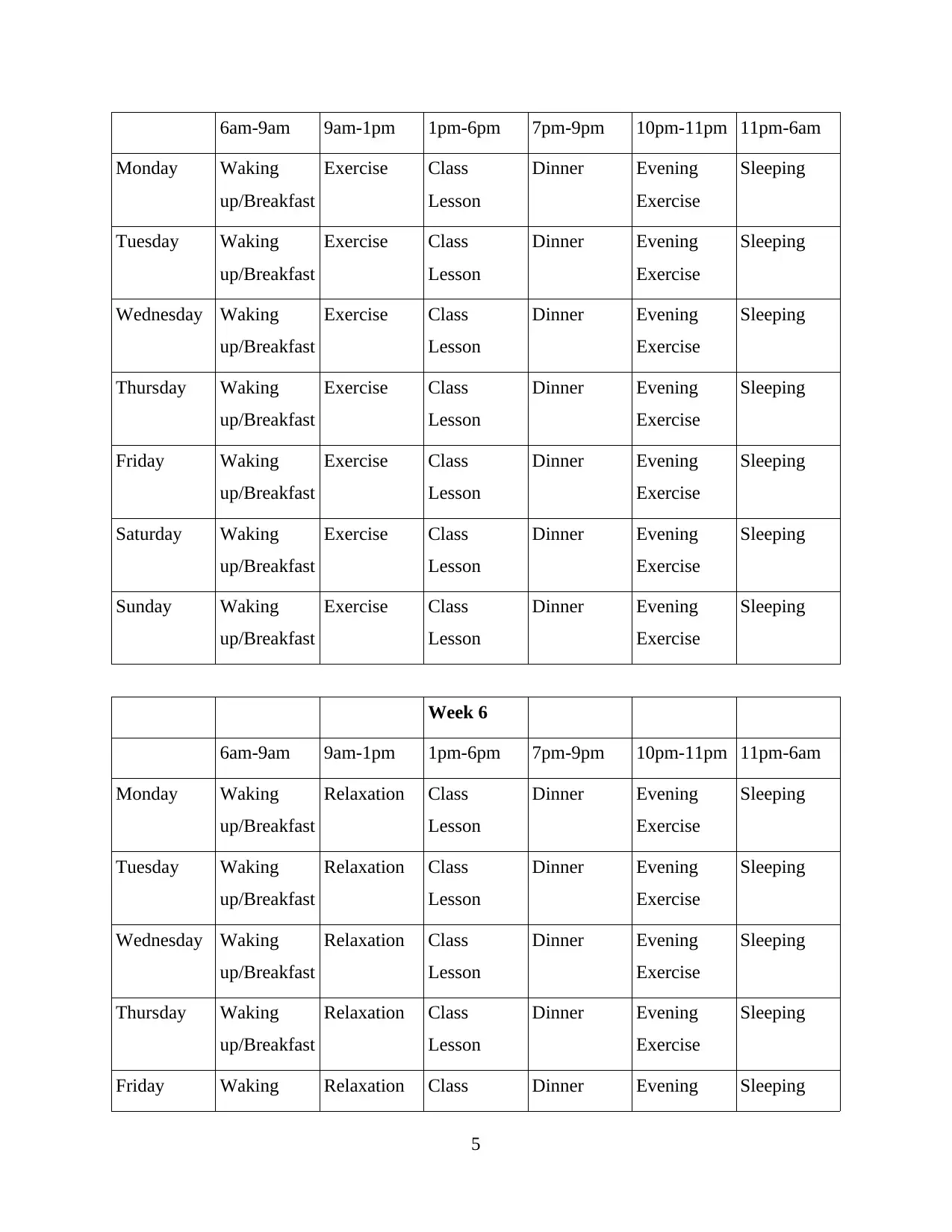
6am-9am 9am-1pm 1pm-6pm 7pm-9pm 10pm-11pm 11pm-6am
Monday Waking
up/Breakfast
Exercise Class
Lesson
Dinner Evening
Exercise
Sleeping
Tuesday Waking
up/Breakfast
Exercise Class
Lesson
Dinner Evening
Exercise
Sleeping
Wednesday Waking
up/Breakfast
Exercise Class
Lesson
Dinner Evening
Exercise
Sleeping
Thursday Waking
up/Breakfast
Exercise Class
Lesson
Dinner Evening
Exercise
Sleeping
Friday Waking
up/Breakfast
Exercise Class
Lesson
Dinner Evening
Exercise
Sleeping
Saturday Waking
up/Breakfast
Exercise Class
Lesson
Dinner Evening
Exercise
Sleeping
Sunday Waking
up/Breakfast
Exercise Class
Lesson
Dinner Evening
Exercise
Sleeping
Week 6
6am-9am 9am-1pm 1pm-6pm 7pm-9pm 10pm-11pm 11pm-6am
Monday Waking
up/Breakfast
Relaxation Class
Lesson
Dinner Evening
Exercise
Sleeping
Tuesday Waking
up/Breakfast
Relaxation Class
Lesson
Dinner Evening
Exercise
Sleeping
Wednesday Waking
up/Breakfast
Relaxation Class
Lesson
Dinner Evening
Exercise
Sleeping
Thursday Waking
up/Breakfast
Relaxation Class
Lesson
Dinner Evening
Exercise
Sleeping
Friday Waking Relaxation Class Dinner Evening Sleeping
5
Monday Waking
up/Breakfast
Exercise Class
Lesson
Dinner Evening
Exercise
Sleeping
Tuesday Waking
up/Breakfast
Exercise Class
Lesson
Dinner Evening
Exercise
Sleeping
Wednesday Waking
up/Breakfast
Exercise Class
Lesson
Dinner Evening
Exercise
Sleeping
Thursday Waking
up/Breakfast
Exercise Class
Lesson
Dinner Evening
Exercise
Sleeping
Friday Waking
up/Breakfast
Exercise Class
Lesson
Dinner Evening
Exercise
Sleeping
Saturday Waking
up/Breakfast
Exercise Class
Lesson
Dinner Evening
Exercise
Sleeping
Sunday Waking
up/Breakfast
Exercise Class
Lesson
Dinner Evening
Exercise
Sleeping
Week 6
6am-9am 9am-1pm 1pm-6pm 7pm-9pm 10pm-11pm 11pm-6am
Monday Waking
up/Breakfast
Relaxation Class
Lesson
Dinner Evening
Exercise
Sleeping
Tuesday Waking
up/Breakfast
Relaxation Class
Lesson
Dinner Evening
Exercise
Sleeping
Wednesday Waking
up/Breakfast
Relaxation Class
Lesson
Dinner Evening
Exercise
Sleeping
Thursday Waking
up/Breakfast
Relaxation Class
Lesson
Dinner Evening
Exercise
Sleeping
Friday Waking Relaxation Class Dinner Evening Sleeping
5
Paraphrase This Document
Need a fresh take? Get an instant paraphrase of this document with our AI Paraphraser
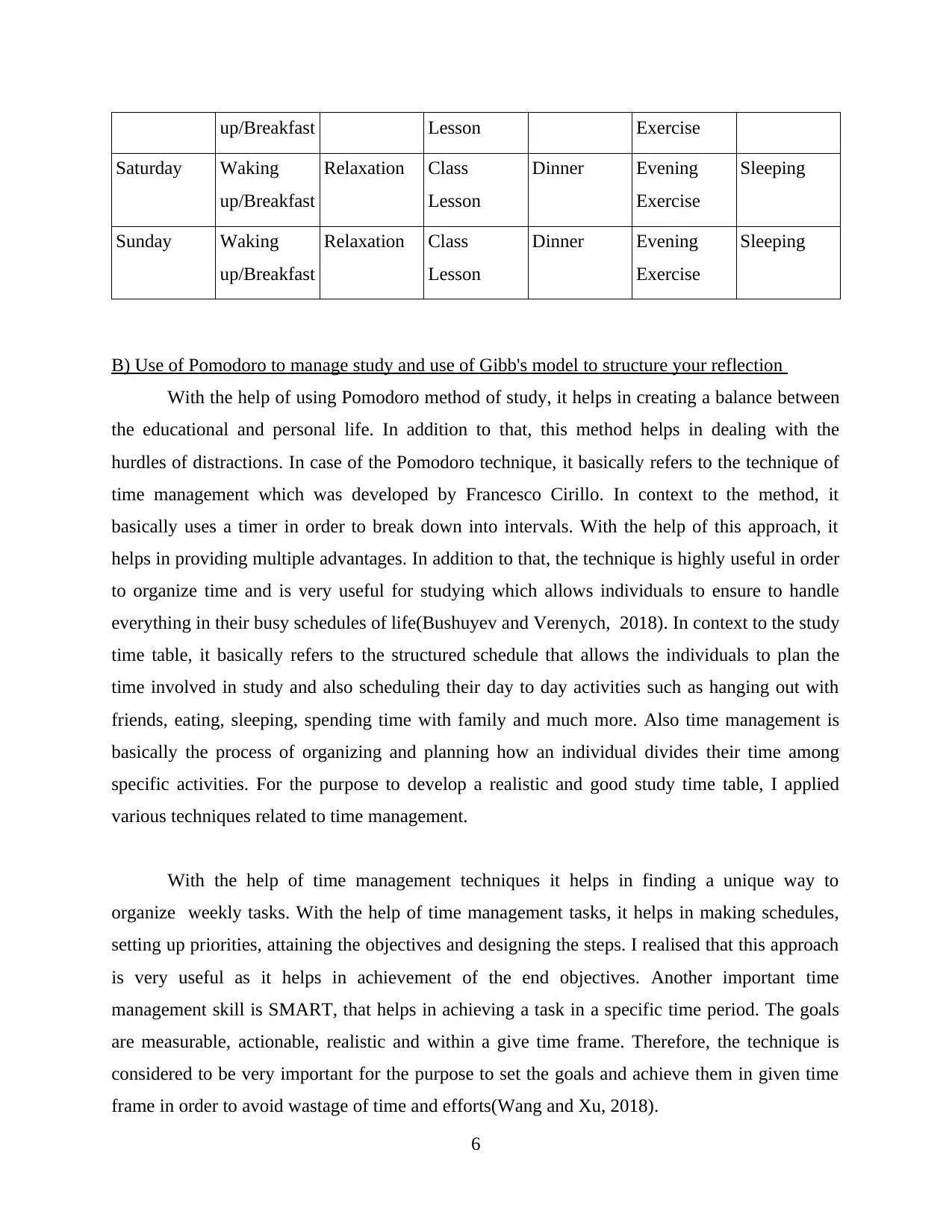
up/Breakfast Lesson Exercise
Saturday Waking
up/Breakfast
Relaxation Class
Lesson
Dinner Evening
Exercise
Sleeping
Sunday Waking
up/Breakfast
Relaxation Class
Lesson
Dinner Evening
Exercise
Sleeping
B) Use of Pomodoro to manage study and use of Gibb's model to structure your reflection
With the help of using Pomodoro method of study, it helps in creating a balance between
the educational and personal life. In addition to that, this method helps in dealing with the
hurdles of distractions. In case of the Pomodoro technique, it basically refers to the technique of
time management which was developed by Francesco Cirillo. In context to the method, it
basically uses a timer in order to break down into intervals. With the help of this approach, it
helps in providing multiple advantages. In addition to that, the technique is highly useful in order
to organize time and is very useful for studying which allows individuals to ensure to handle
everything in their busy schedules of life(Bushuyev and Verenych, 2018). In context to the study
time table, it basically refers to the structured schedule that allows the individuals to plan the
time involved in study and also scheduling their day to day activities such as hanging out with
friends, eating, sleeping, spending time with family and much more. Also time management is
basically the process of organizing and planning how an individual divides their time among
specific activities. For the purpose to develop a realistic and good study time table, I applied
various techniques related to time management.
With the help of time management techniques it helps in finding a unique way to
organize weekly tasks. With the help of time management tasks, it helps in making schedules,
setting up priorities, attaining the objectives and designing the steps. I realised that this approach
is very useful as it helps in achievement of the end objectives. Another important time
management skill is SMART, that helps in achieving a task in a specific time period. The goals
are measurable, actionable, realistic and within a give time frame. Therefore, the technique is
considered to be very important for the purpose to set the goals and achieve them in given time
frame in order to avoid wastage of time and efforts(Wang and Xu, 2018).
6
Saturday Waking
up/Breakfast
Relaxation Class
Lesson
Dinner Evening
Exercise
Sleeping
Sunday Waking
up/Breakfast
Relaxation Class
Lesson
Dinner Evening
Exercise
Sleeping
B) Use of Pomodoro to manage study and use of Gibb's model to structure your reflection
With the help of using Pomodoro method of study, it helps in creating a balance between
the educational and personal life. In addition to that, this method helps in dealing with the
hurdles of distractions. In case of the Pomodoro technique, it basically refers to the technique of
time management which was developed by Francesco Cirillo. In context to the method, it
basically uses a timer in order to break down into intervals. With the help of this approach, it
helps in providing multiple advantages. In addition to that, the technique is highly useful in order
to organize time and is very useful for studying which allows individuals to ensure to handle
everything in their busy schedules of life(Bushuyev and Verenych, 2018). In context to the study
time table, it basically refers to the structured schedule that allows the individuals to plan the
time involved in study and also scheduling their day to day activities such as hanging out with
friends, eating, sleeping, spending time with family and much more. Also time management is
basically the process of organizing and planning how an individual divides their time among
specific activities. For the purpose to develop a realistic and good study time table, I applied
various techniques related to time management.
With the help of time management techniques it helps in finding a unique way to
organize weekly tasks. With the help of time management tasks, it helps in making schedules,
setting up priorities, attaining the objectives and designing the steps. I realised that this approach
is very useful as it helps in achievement of the end objectives. Another important time
management skill is SMART, that helps in achieving a task in a specific time period. The goals
are measurable, actionable, realistic and within a give time frame. Therefore, the technique is
considered to be very important for the purpose to set the goals and achieve them in given time
frame in order to avoid wastage of time and efforts(Wang and Xu, 2018).
6
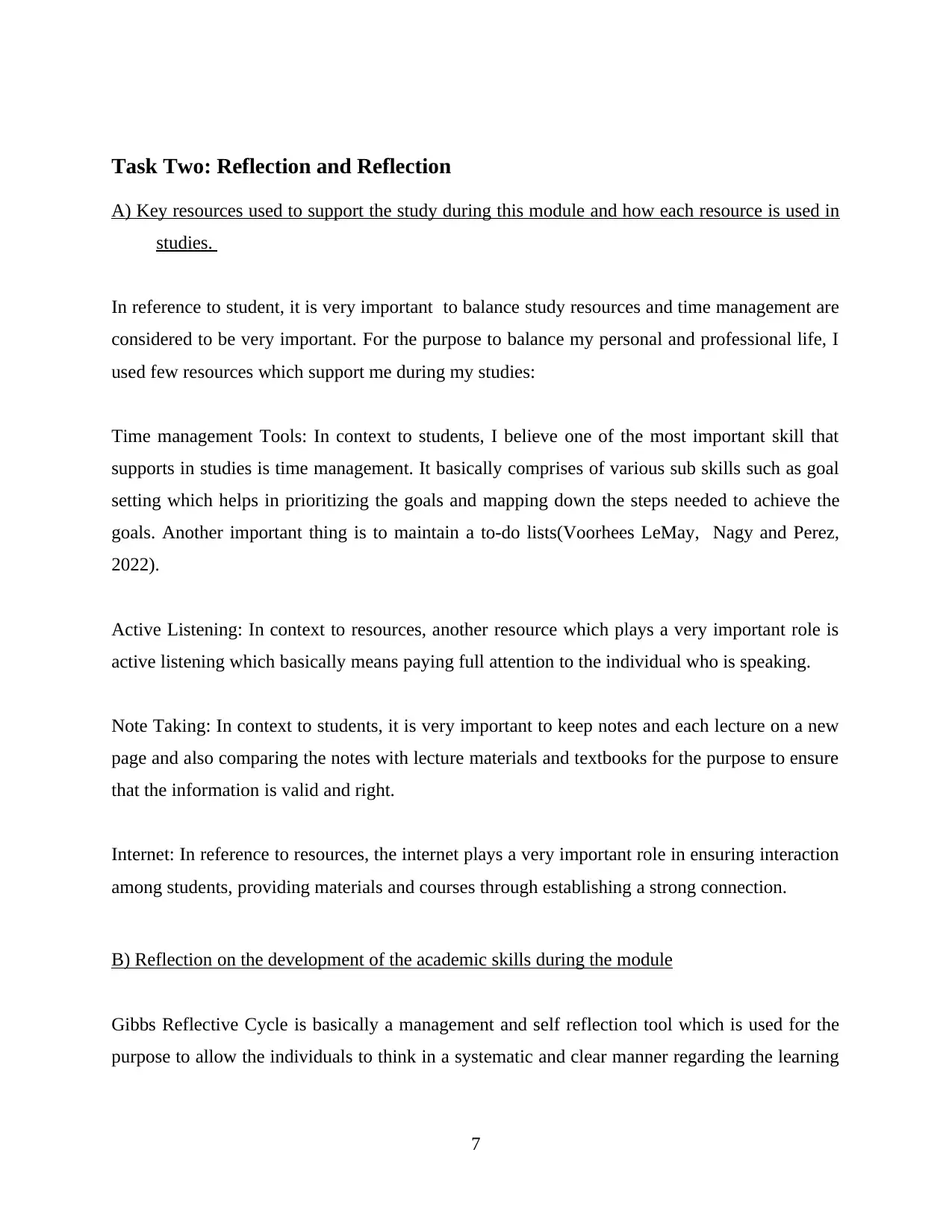
Task Two: Reflection and Reflection
A) Key resources used to support the study during this module and how each resource is used in
studies.
In reference to student, it is very important to balance study resources and time management are
considered to be very important. For the purpose to balance my personal and professional life, I
used few resources which support me during my studies:
Time management Tools: In context to students, I believe one of the most important skill that
supports in studies is time management. It basically comprises of various sub skills such as goal
setting which helps in prioritizing the goals and mapping down the steps needed to achieve the
goals. Another important thing is to maintain a to-do lists(Voorhees LeMay, Nagy and Perez,
2022).
Active Listening: In context to resources, another resource which plays a very important role is
active listening which basically means paying full attention to the individual who is speaking.
Note Taking: In context to students, it is very important to keep notes and each lecture on a new
page and also comparing the notes with lecture materials and textbooks for the purpose to ensure
that the information is valid and right.
Internet: In reference to resources, the internet plays a very important role in ensuring interaction
among students, providing materials and courses through establishing a strong connection.
B) Reflection on the development of the academic skills during the module
Gibbs Reflective Cycle is basically a management and self reflection tool which is used for the
purpose to allow the individuals to think in a systematic and clear manner regarding the learning
7
A) Key resources used to support the study during this module and how each resource is used in
studies.
In reference to student, it is very important to balance study resources and time management are
considered to be very important. For the purpose to balance my personal and professional life, I
used few resources which support me during my studies:
Time management Tools: In context to students, I believe one of the most important skill that
supports in studies is time management. It basically comprises of various sub skills such as goal
setting which helps in prioritizing the goals and mapping down the steps needed to achieve the
goals. Another important thing is to maintain a to-do lists(Voorhees LeMay, Nagy and Perez,
2022).
Active Listening: In context to resources, another resource which plays a very important role is
active listening which basically means paying full attention to the individual who is speaking.
Note Taking: In context to students, it is very important to keep notes and each lecture on a new
page and also comparing the notes with lecture materials and textbooks for the purpose to ensure
that the information is valid and right.
Internet: In reference to resources, the internet plays a very important role in ensuring interaction
among students, providing materials and courses through establishing a strong connection.
B) Reflection on the development of the academic skills during the module
Gibbs Reflective Cycle is basically a management and self reflection tool which is used for the
purpose to allow the individuals to think in a systematic and clear manner regarding the learning
7
⊘ This is a preview!⊘
Do you want full access?
Subscribe today to unlock all pages.

Trusted by 1+ million students worldwide
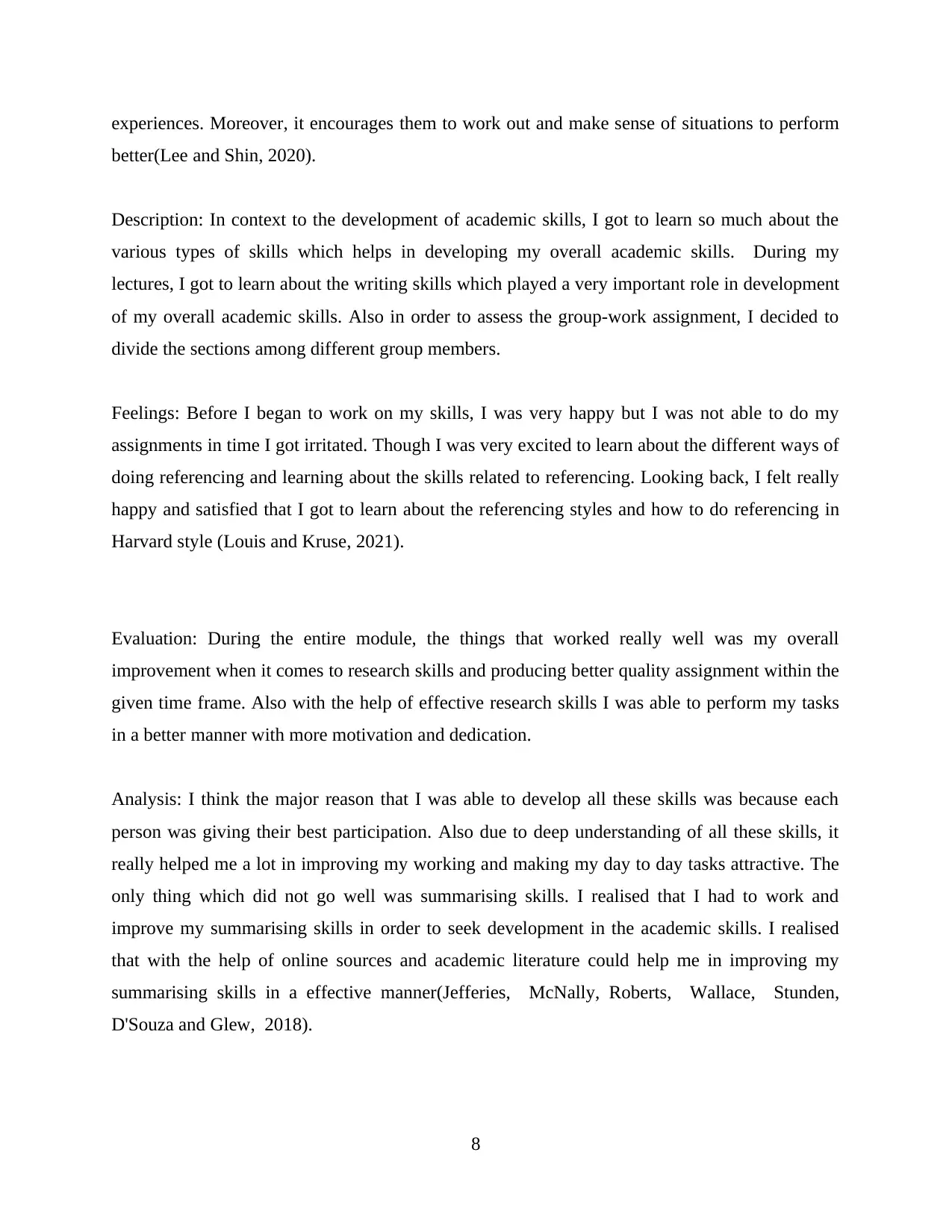
experiences. Moreover, it encourages them to work out and make sense of situations to perform
better(Lee and Shin, 2020).
Description: In context to the development of academic skills, I got to learn so much about the
various types of skills which helps in developing my overall academic skills. During my
lectures, I got to learn about the writing skills which played a very important role in development
of my overall academic skills. Also in order to assess the group-work assignment, I decided to
divide the sections among different group members.
Feelings: Before I began to work on my skills, I was very happy but I was not able to do my
assignments in time I got irritated. Though I was very excited to learn about the different ways of
doing referencing and learning about the skills related to referencing. Looking back, I felt really
happy and satisfied that I got to learn about the referencing styles and how to do referencing in
Harvard style (Louis and Kruse, 2021).
Evaluation: During the entire module, the things that worked really well was my overall
improvement when it comes to research skills and producing better quality assignment within the
given time frame. Also with the help of effective research skills I was able to perform my tasks
in a better manner with more motivation and dedication.
Analysis: I think the major reason that I was able to develop all these skills was because each
person was giving their best participation. Also due to deep understanding of all these skills, it
really helped me a lot in improving my working and making my day to day tasks attractive. The
only thing which did not go well was summarising skills. I realised that I had to work and
improve my summarising skills in order to seek development in the academic skills. I realised
that with the help of online sources and academic literature could help me in improving my
summarising skills in a effective manner(Jefferies, McNally, Roberts, Wallace, Stunden,
D'Souza and Glew, 2018).
8
better(Lee and Shin, 2020).
Description: In context to the development of academic skills, I got to learn so much about the
various types of skills which helps in developing my overall academic skills. During my
lectures, I got to learn about the writing skills which played a very important role in development
of my overall academic skills. Also in order to assess the group-work assignment, I decided to
divide the sections among different group members.
Feelings: Before I began to work on my skills, I was very happy but I was not able to do my
assignments in time I got irritated. Though I was very excited to learn about the different ways of
doing referencing and learning about the skills related to referencing. Looking back, I felt really
happy and satisfied that I got to learn about the referencing styles and how to do referencing in
Harvard style (Louis and Kruse, 2021).
Evaluation: During the entire module, the things that worked really well was my overall
improvement when it comes to research skills and producing better quality assignment within the
given time frame. Also with the help of effective research skills I was able to perform my tasks
in a better manner with more motivation and dedication.
Analysis: I think the major reason that I was able to develop all these skills was because each
person was giving their best participation. Also due to deep understanding of all these skills, it
really helped me a lot in improving my working and making my day to day tasks attractive. The
only thing which did not go well was summarising skills. I realised that I had to work and
improve my summarising skills in order to seek development in the academic skills. I realised
that with the help of online sources and academic literature could help me in improving my
summarising skills in a effective manner(Jefferies, McNally, Roberts, Wallace, Stunden,
D'Souza and Glew, 2018).
8
Paraphrase This Document
Need a fresh take? Get an instant paraphrase of this document with our AI Paraphraser
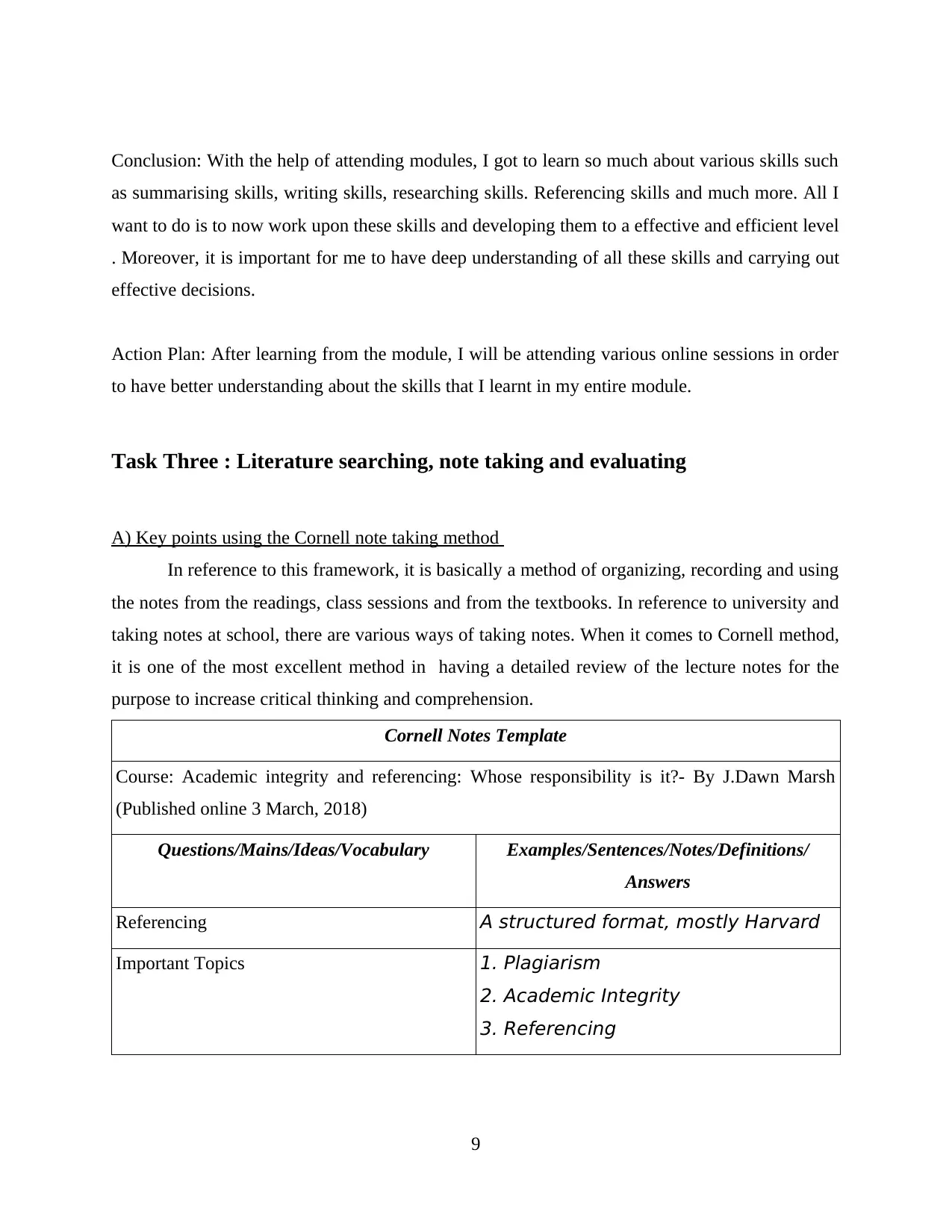
Conclusion: With the help of attending modules, I got to learn so much about various skills such
as summarising skills, writing skills, researching skills. Referencing skills and much more. All I
want to do is to now work upon these skills and developing them to a effective and efficient level
. Moreover, it is important for me to have deep understanding of all these skills and carrying out
effective decisions.
Action Plan: After learning from the module, I will be attending various online sessions in order
to have better understanding about the skills that I learnt in my entire module.
Task Three : Literature searching, note taking and evaluating
A) Key points using the Cornell note taking method
In reference to this framework, it is basically a method of organizing, recording and using
the notes from the readings, class sessions and from the textbooks. In reference to university and
taking notes at school, there are various ways of taking notes. When it comes to Cornell method,
it is one of the most excellent method in having a detailed review of the lecture notes for the
purpose to increase critical thinking and comprehension.
Cornell Notes Template
Course: Academic integrity and referencing: Whose responsibility is it?- By J.Dawn Marsh
(Published online 3 March, 2018)
Questions/Mains/Ideas/Vocabulary Examples/Sentences/Notes/Definitions/
Answers
Referencing A structured format, mostly Harvard
Important Topics 1. Plagiarism
2. Academic Integrity
3. Referencing
9
as summarising skills, writing skills, researching skills. Referencing skills and much more. All I
want to do is to now work upon these skills and developing them to a effective and efficient level
. Moreover, it is important for me to have deep understanding of all these skills and carrying out
effective decisions.
Action Plan: After learning from the module, I will be attending various online sessions in order
to have better understanding about the skills that I learnt in my entire module.
Task Three : Literature searching, note taking and evaluating
A) Key points using the Cornell note taking method
In reference to this framework, it is basically a method of organizing, recording and using
the notes from the readings, class sessions and from the textbooks. In reference to university and
taking notes at school, there are various ways of taking notes. When it comes to Cornell method,
it is one of the most excellent method in having a detailed review of the lecture notes for the
purpose to increase critical thinking and comprehension.
Cornell Notes Template
Course: Academic integrity and referencing: Whose responsibility is it?- By J.Dawn Marsh
(Published online 3 March, 2018)
Questions/Mains/Ideas/Vocabulary Examples/Sentences/Notes/Definitions/
Answers
Referencing A structured format, mostly Harvard
Important Topics 1. Plagiarism
2. Academic Integrity
3. Referencing
9
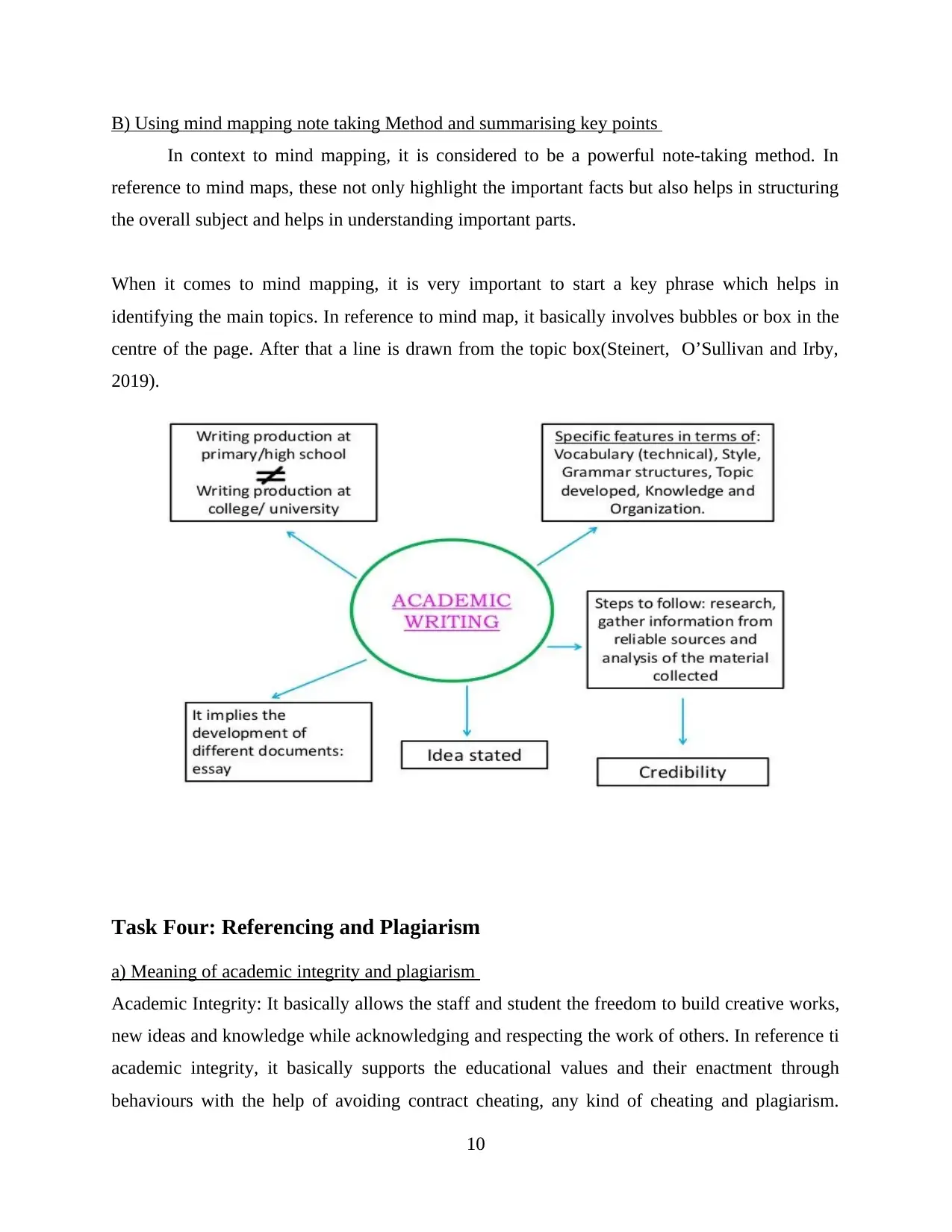
B) Using mind mapping note taking Method and summarising key points
In context to mind mapping, it is considered to be a powerful note-taking method. In
reference to mind maps, these not only highlight the important facts but also helps in structuring
the overall subject and helps in understanding important parts.
When it comes to mind mapping, it is very important to start a key phrase which helps in
identifying the main topics. In reference to mind map, it basically involves bubbles or box in the
centre of the page. After that a line is drawn from the topic box(Steinert, O’Sullivan and Irby,
2019).
Task Four: Referencing and Plagiarism
a) Meaning of academic integrity and plagiarism
Academic Integrity: It basically allows the staff and student the freedom to build creative works,
new ideas and knowledge while acknowledging and respecting the work of others. In reference ti
academic integrity, it basically supports the educational values and their enactment through
behaviours with the help of avoiding contract cheating, any kind of cheating and plagiarism.
10
In context to mind mapping, it is considered to be a powerful note-taking method. In
reference to mind maps, these not only highlight the important facts but also helps in structuring
the overall subject and helps in understanding important parts.
When it comes to mind mapping, it is very important to start a key phrase which helps in
identifying the main topics. In reference to mind map, it basically involves bubbles or box in the
centre of the page. After that a line is drawn from the topic box(Steinert, O’Sullivan and Irby,
2019).
Task Four: Referencing and Plagiarism
a) Meaning of academic integrity and plagiarism
Academic Integrity: It basically allows the staff and student the freedom to build creative works,
new ideas and knowledge while acknowledging and respecting the work of others. In reference ti
academic integrity, it basically supports the educational values and their enactment through
behaviours with the help of avoiding contract cheating, any kind of cheating and plagiarism.
10
⊘ This is a preview!⊘
Do you want full access?
Subscribe today to unlock all pages.

Trusted by 1+ million students worldwide
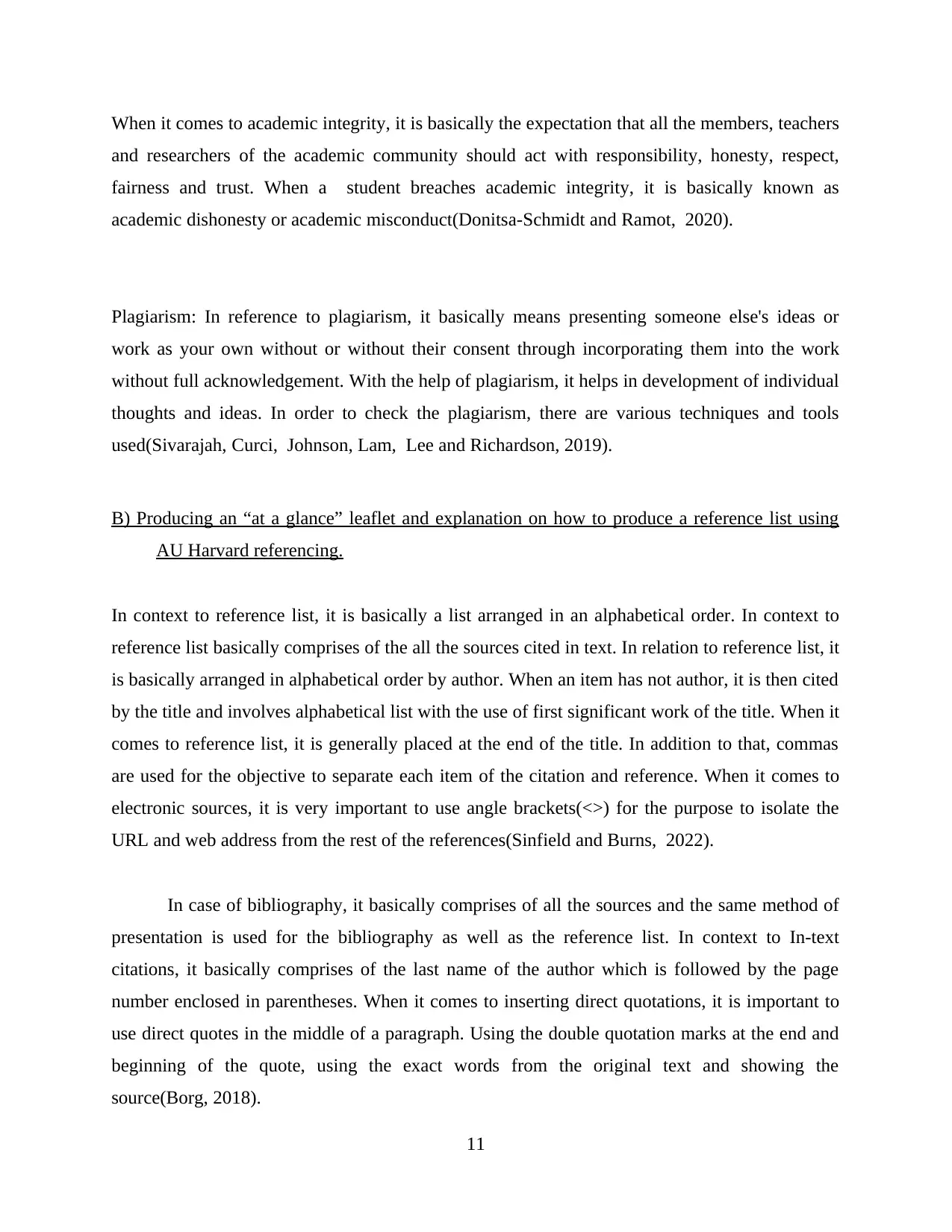
When it comes to academic integrity, it is basically the expectation that all the members, teachers
and researchers of the academic community should act with responsibility, honesty, respect,
fairness and trust. When a student breaches academic integrity, it is basically known as
academic dishonesty or academic misconduct(Donitsa-Schmidt and Ramot, 2020).
Plagiarism: In reference to plagiarism, it basically means presenting someone else's ideas or
work as your own without or without their consent through incorporating them into the work
without full acknowledgement. With the help of plagiarism, it helps in development of individual
thoughts and ideas. In order to check the plagiarism, there are various techniques and tools
used(Sivarajah, Curci, Johnson, Lam, Lee and Richardson, 2019).
B) Producing an “at a glance” leaflet and explanation on how to produce a reference list using
AU Harvard referencing.
In context to reference list, it is basically a list arranged in an alphabetical order. In context to
reference list basically comprises of the all the sources cited in text. In relation to reference list, it
is basically arranged in alphabetical order by author. When an item has not author, it is then cited
by the title and involves alphabetical list with the use of first significant work of the title. When it
comes to reference list, it is generally placed at the end of the title. In addition to that, commas
are used for the objective to separate each item of the citation and reference. When it comes to
electronic sources, it is very important to use angle brackets(<>) for the purpose to isolate the
URL and web address from the rest of the references(Sinfield and Burns, 2022).
In case of bibliography, it basically comprises of all the sources and the same method of
presentation is used for the bibliography as well as the reference list. In context to In-text
citations, it basically comprises of the last name of the author which is followed by the page
number enclosed in parentheses. When it comes to inserting direct quotations, it is important to
use direct quotes in the middle of a paragraph. Using the double quotation marks at the end and
beginning of the quote, using the exact words from the original text and showing the
source(Borg, 2018).
11
and researchers of the academic community should act with responsibility, honesty, respect,
fairness and trust. When a student breaches academic integrity, it is basically known as
academic dishonesty or academic misconduct(Donitsa-Schmidt and Ramot, 2020).
Plagiarism: In reference to plagiarism, it basically means presenting someone else's ideas or
work as your own without or without their consent through incorporating them into the work
without full acknowledgement. With the help of plagiarism, it helps in development of individual
thoughts and ideas. In order to check the plagiarism, there are various techniques and tools
used(Sivarajah, Curci, Johnson, Lam, Lee and Richardson, 2019).
B) Producing an “at a glance” leaflet and explanation on how to produce a reference list using
AU Harvard referencing.
In context to reference list, it is basically a list arranged in an alphabetical order. In context to
reference list basically comprises of the all the sources cited in text. In relation to reference list, it
is basically arranged in alphabetical order by author. When an item has not author, it is then cited
by the title and involves alphabetical list with the use of first significant work of the title. When it
comes to reference list, it is generally placed at the end of the title. In addition to that, commas
are used for the objective to separate each item of the citation and reference. When it comes to
electronic sources, it is very important to use angle brackets(<>) for the purpose to isolate the
URL and web address from the rest of the references(Sinfield and Burns, 2022).
In case of bibliography, it basically comprises of all the sources and the same method of
presentation is used for the bibliography as well as the reference list. In context to In-text
citations, it basically comprises of the last name of the author which is followed by the page
number enclosed in parentheses. When it comes to inserting direct quotations, it is important to
use direct quotes in the middle of a paragraph. Using the double quotation marks at the end and
beginning of the quote, using the exact words from the original text and showing the
source(Borg, 2018).
11
Paraphrase This Document
Need a fresh take? Get an instant paraphrase of this document with our AI Paraphraser
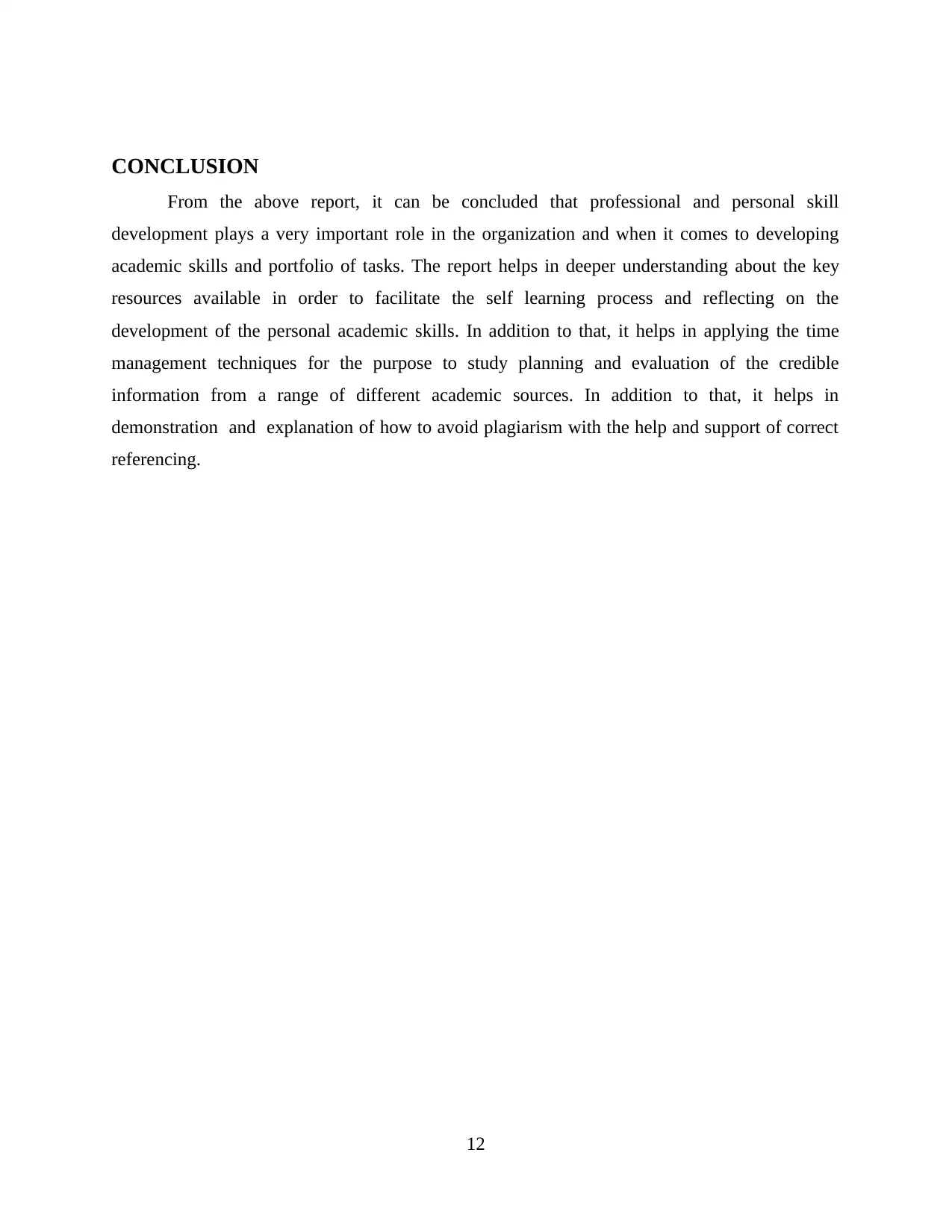
CONCLUSION
From the above report, it can be concluded that professional and personal skill
development plays a very important role in the organization and when it comes to developing
academic skills and portfolio of tasks. The report helps in deeper understanding about the key
resources available in order to facilitate the self learning process and reflecting on the
development of the personal academic skills. In addition to that, it helps in applying the time
management techniques for the purpose to study planning and evaluation of the credible
information from a range of different academic sources. In addition to that, it helps in
demonstration and explanation of how to avoid plagiarism with the help and support of correct
referencing.
12
From the above report, it can be concluded that professional and personal skill
development plays a very important role in the organization and when it comes to developing
academic skills and portfolio of tasks. The report helps in deeper understanding about the key
resources available in order to facilitate the self learning process and reflecting on the
development of the personal academic skills. In addition to that, it helps in applying the time
management techniques for the purpose to study planning and evaluation of the credible
information from a range of different academic sources. In addition to that, it helps in
demonstration and explanation of how to avoid plagiarism with the help and support of correct
referencing.
12
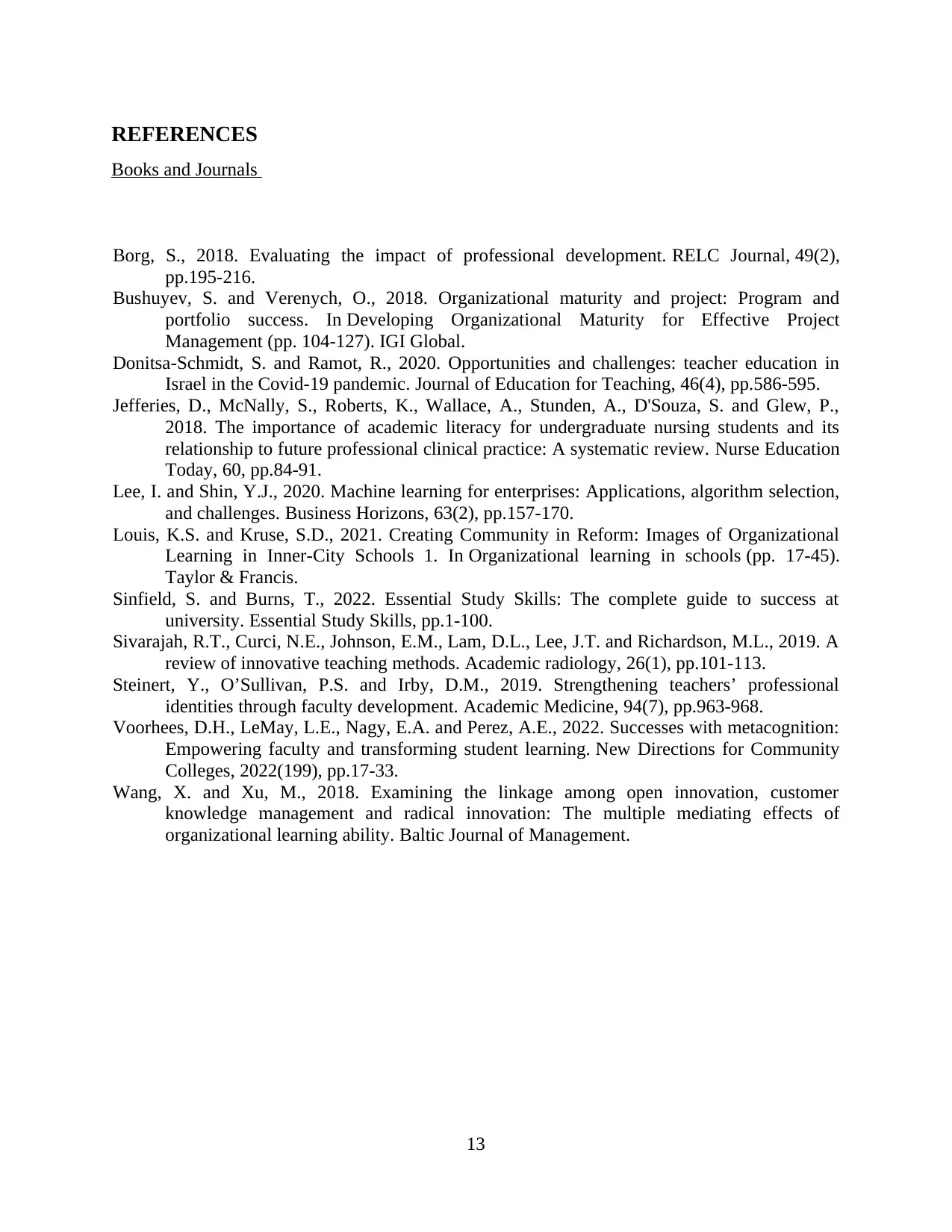
REFERENCES
Books and Journals
Borg, S., 2018. Evaluating the impact of professional development. RELC Journal, 49(2),
pp.195-216.
Bushuyev, S. and Verenych, O., 2018. Organizational maturity and project: Program and
portfolio success. In Developing Organizational Maturity for Effective Project
Management (pp. 104-127). IGI Global.
Donitsa-Schmidt, S. and Ramot, R., 2020. Opportunities and challenges: teacher education in
Israel in the Covid-19 pandemic. Journal of Education for Teaching, 46(4), pp.586-595.
Jefferies, D., McNally, S., Roberts, K., Wallace, A., Stunden, A., D'Souza, S. and Glew, P.,
2018. The importance of academic literacy for undergraduate nursing students and its
relationship to future professional clinical practice: A systematic review. Nurse Education
Today, 60, pp.84-91.
Lee, I. and Shin, Y.J., 2020. Machine learning for enterprises: Applications, algorithm selection,
and challenges. Business Horizons, 63(2), pp.157-170.
Louis, K.S. and Kruse, S.D., 2021. Creating Community in Reform: Images of Organizational
Learning in Inner-City Schools 1. In Organizational learning in schools (pp. 17-45).
Taylor & Francis.
Sinfield, S. and Burns, T., 2022. Essential Study Skills: The complete guide to success at
university. Essential Study Skills, pp.1-100.
Sivarajah, R.T., Curci, N.E., Johnson, E.M., Lam, D.L., Lee, J.T. and Richardson, M.L., 2019. A
review of innovative teaching methods. Academic radiology, 26(1), pp.101-113.
Steinert, Y., O’Sullivan, P.S. and Irby, D.M., 2019. Strengthening teachers’ professional
identities through faculty development. Academic Medicine, 94(7), pp.963-968.
Voorhees, D.H., LeMay, L.E., Nagy, E.A. and Perez, A.E., 2022. Successes with metacognition:
Empowering faculty and transforming student learning. New Directions for Community
Colleges, 2022(199), pp.17-33.
Wang, X. and Xu, M., 2018. Examining the linkage among open innovation, customer
knowledge management and radical innovation: The multiple mediating effects of
organizational learning ability. Baltic Journal of Management.
13
Books and Journals
Borg, S., 2018. Evaluating the impact of professional development. RELC Journal, 49(2),
pp.195-216.
Bushuyev, S. and Verenych, O., 2018. Organizational maturity and project: Program and
portfolio success. In Developing Organizational Maturity for Effective Project
Management (pp. 104-127). IGI Global.
Donitsa-Schmidt, S. and Ramot, R., 2020. Opportunities and challenges: teacher education in
Israel in the Covid-19 pandemic. Journal of Education for Teaching, 46(4), pp.586-595.
Jefferies, D., McNally, S., Roberts, K., Wallace, A., Stunden, A., D'Souza, S. and Glew, P.,
2018. The importance of academic literacy for undergraduate nursing students and its
relationship to future professional clinical practice: A systematic review. Nurse Education
Today, 60, pp.84-91.
Lee, I. and Shin, Y.J., 2020. Machine learning for enterprises: Applications, algorithm selection,
and challenges. Business Horizons, 63(2), pp.157-170.
Louis, K.S. and Kruse, S.D., 2021. Creating Community in Reform: Images of Organizational
Learning in Inner-City Schools 1. In Organizational learning in schools (pp. 17-45).
Taylor & Francis.
Sinfield, S. and Burns, T., 2022. Essential Study Skills: The complete guide to success at
university. Essential Study Skills, pp.1-100.
Sivarajah, R.T., Curci, N.E., Johnson, E.M., Lam, D.L., Lee, J.T. and Richardson, M.L., 2019. A
review of innovative teaching methods. Academic radiology, 26(1), pp.101-113.
Steinert, Y., O’Sullivan, P.S. and Irby, D.M., 2019. Strengthening teachers’ professional
identities through faculty development. Academic Medicine, 94(7), pp.963-968.
Voorhees, D.H., LeMay, L.E., Nagy, E.A. and Perez, A.E., 2022. Successes with metacognition:
Empowering faculty and transforming student learning. New Directions for Community
Colleges, 2022(199), pp.17-33.
Wang, X. and Xu, M., 2018. Examining the linkage among open innovation, customer
knowledge management and radical innovation: The multiple mediating effects of
organizational learning ability. Baltic Journal of Management.
13
⊘ This is a preview!⊘
Do you want full access?
Subscribe today to unlock all pages.

Trusted by 1+ million students worldwide

14
1 out of 16
Related Documents
Your All-in-One AI-Powered Toolkit for Academic Success.
+13062052269
info@desklib.com
Available 24*7 on WhatsApp / Email
![[object Object]](/_next/static/media/star-bottom.7253800d.svg)
Unlock your academic potential
© 2024 | Zucol Services PVT LTD | All rights reserved.



